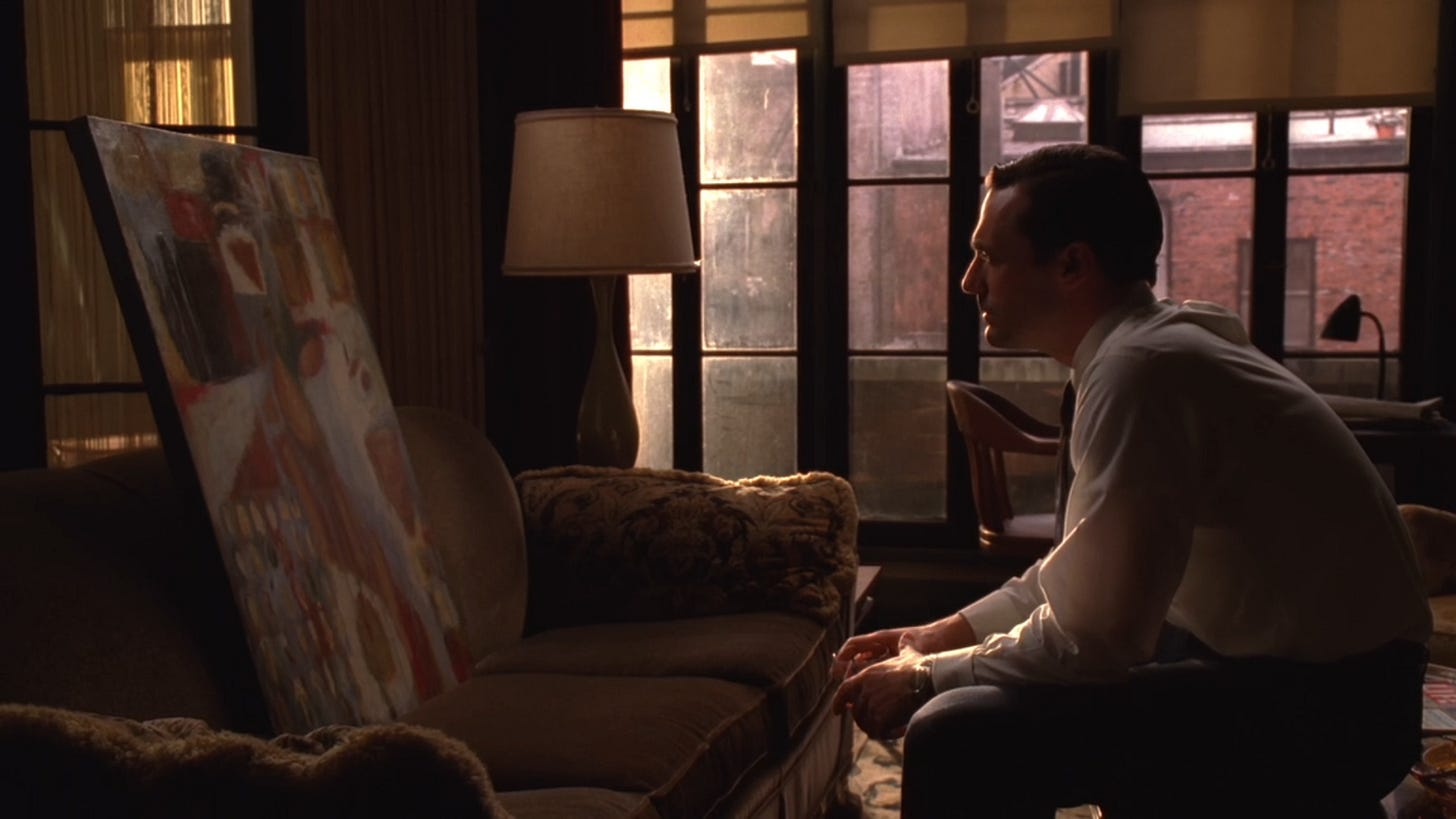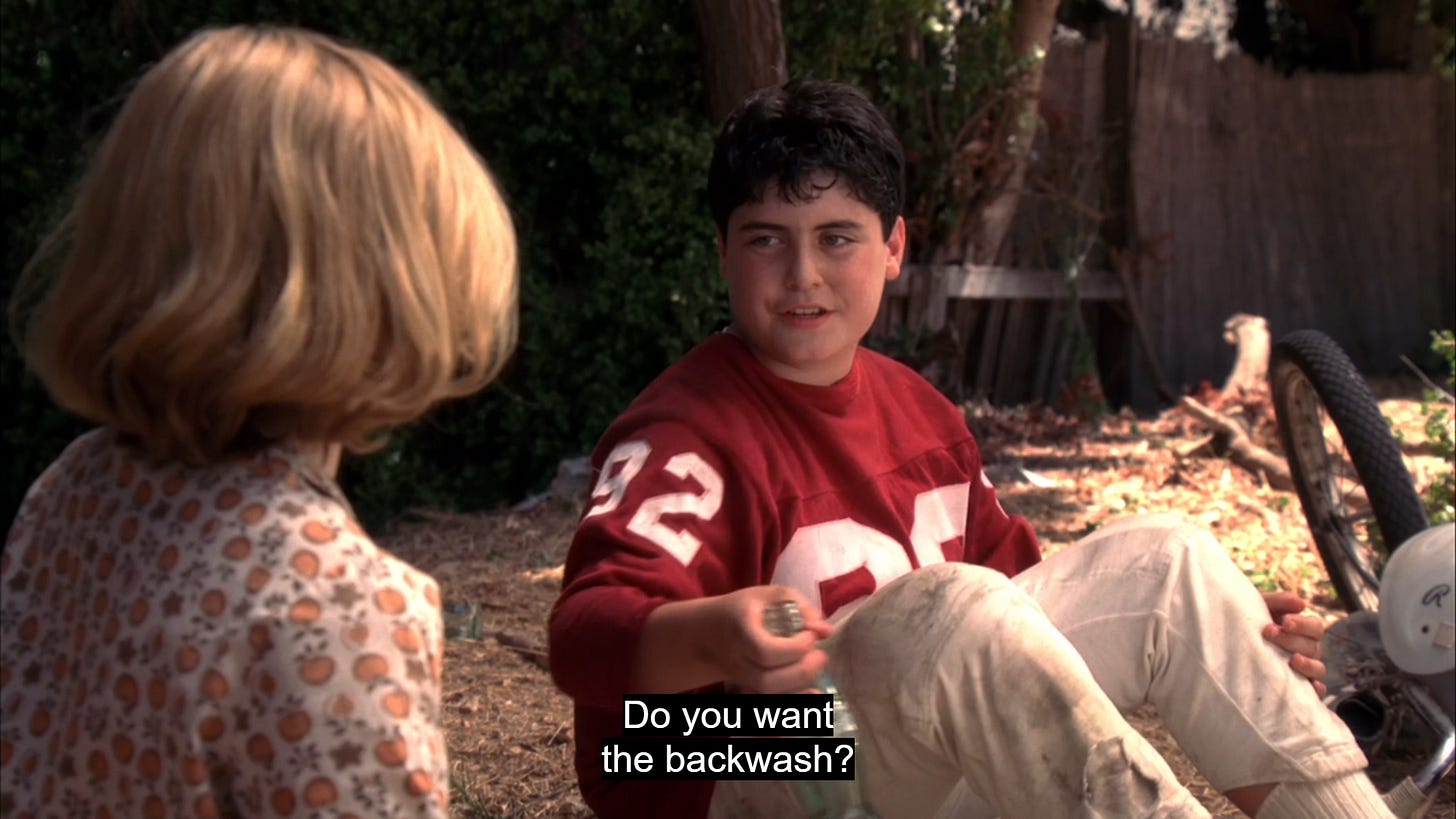Season 4: Episode 12
“Blowing Smoke”
Written by: Andre & Maria Jacquemetton
Directed by: John Slattery
Setting: September 1965
Season 4 of Mad Men is among television’s best writing ever. I sing this song repeatedly, but on this rewatch the show’s effectiveness in both standing alone and continuing a narrative has stood out.
Having never seen an episode of Mad Men, “Blowing Smoke” speaks to anyone who has seen their workplace begin to crumble. There’s no confusion over how we got here, just an immediate understanding of “Hmm, bleeding clients and pretending that everything is fine… I’ve been there.”
Mad Men speaks from the past to echo through an understanding of our own lives.
We all understand the feeling of an uncertain future.
For those who have watched the show, “Blowing Smoke” is the closing word of the pilot episode’s themes. Episode 1 of Season 1 “Smoke Gets in Your Eyes” is about how advertising hazed our view of the tobacco industry. In “Blowing Smoke” set over five years later, Don Draper feels the sting of that same smoke. The sins of Season 1 are given an opportunity for confession in Season 4.
Let’s take a chance to review Don’s most brilliant work since “It’s Toasted.” Read these words as if you were opening the New York Times in September 1965.
“Why I’m Quitting Tobacco”
By Donald F. Draper
Recently my advertising agency ended a long relationship with Lucky Strike cigarettes, and I’m relieved.
For over 25 years we devoted ourselves to peddling a product for which good work is irrelevant, because people can’t stop themselves from buying it. A product that never improves, that causes illness, and makes people unhappy. But there was money in it. A lot of money. In fact, our entire business depended on it. We knew it wasn’t good for us, but we couldn’t stop.
And then, when Lucky Strike moved their business elsewhere, I realized, here was my chance to be someone who could sleep at night, because I know what I’m selling doesn’t kill my customers.
So as of today, Sterling Cooper Draper Pryce will no longer take tobacco accounts. We know it’s going to be hard. If you’re interested in cigarette work, here’s a list of agencies that do it well: BBDO, Leo Burnett, McCann Erickson, Cutler Gleason & Chaough, and Benton & Bowles.
As for us, we welcome all other business because we’re certain that our best work is still ahead of us.
Sincerely,
Donald F. Draper
Creative Director
Sterling Cooper Draper Pryce
This is the most powerful kind of bullshit because everything Don is saying is true. “Why I’m Quitting Tobacco” was written out of desperation and would have been abandoned had there been a realistic chance of securing another tobacco account. These words were held behind a cracking dam for years and could have been written in 1960 had Sterling Cooper’s “It’s Toasted” pitch not succeeded. Though, I don’t think Don would have had the record or status to keep his job back then.

As is everything he creates, this essay is not just about the lies of the tobacco industry.
It is about Don Draper.
While this is a strategic move rather than a moral one, Don Draper still sleeps at night because he has aired his sins. These words reflect his past support of the tobacco industry but, deeper than that, are about his life as a liar and cheat. He never would have been able to propose to Megan and begin his second marriage had he not written this.
“We knew it wasn’t good for us, but we couldn’t stop.”
Don Draper has always known that his actions were immoral and destroyed the world around him. He did not care until he had to answer for them.
His very name is a deal with the Devil for wealth, success, and sex. When it came time to collect, he asked the people to give him his soul back rather than the industry that owned it. The other members of SCDP were incensed that he didn’t consult him but doing it like this was the only way he could believe in both his business and himself.
“Why We’re Quitting Tobacco” co-written by all the partners would say nothing about himself and everything about how they got into this terrible situation.
It is a brilliant move to save SCDP from bankruptcy but does Don learn anything from his words?
Does he now understand that life cannot be built on a foundation of destruction?
The haunting echo “Blowing Smoke” shares with “Smoke Gets in Your Eyes” is the return of a character who disappeared into the smoke five years ago.
Season 1 mistress Midge, now a struggling heroin addict, reappears after hunting down Don. This is not an attempt to remember the past or make the future but to numb the present. She cannot pretend her life is anything other than doom. There is no smoke to blow at her.
Don buys her painting and gives her money that he knows will go towards drugs.
The painting of an artist dying in everything except her art ironically shows Don a way forward. Perhaps this painting is a commentary on Midge’s addiction. Maybe it’s just a random assortment of shapes, no meaning besides to exist.

Don looks beyond the canvas and makes his own meaning.
“Why I’m Quitting Tobacco” is his work of art. It is about more than a man refusing to advertise cigarettes. It is about a man faced with the end of everything he sold his soul for. Creation is immortality and just as a puff of smoke poisons his body, good words leaving them give him reason to breathe easy.
The past does not have to define the future, it can always be made into something good no matter how that process starts.
In addition to Midge, Season 1 staple Glen Bishop appears in a more sympathetic role. We remember every creepy/weird/bizarre moment from this home intruder/hair collector/stalker… and yet we still feel bad for him because we want him to get better.
His friendship with Sally feels pure, they’re two kids from broken homes connecting over scars and emptiness.
Betty can be seen as hating Glen because she refuses to move on from his past but we also should consider her past. Sally connects with Glen because he is someone to talk to completely outside her mother’s world. They are both outcasts of Betty’s scorn and he is the catalyst that encourages Betty to move to a different neighborhood.
Just as Don quits the tobacco industry, Betty quits the suburbs where she started her life with Don. Both of these actions were inevitable but done on impulse. While not done for pure reasons, Don needed to quit tobacco and Betty needed to move on from Don.
How much of the smoke in someone’s eyes comes from their own mouth?












